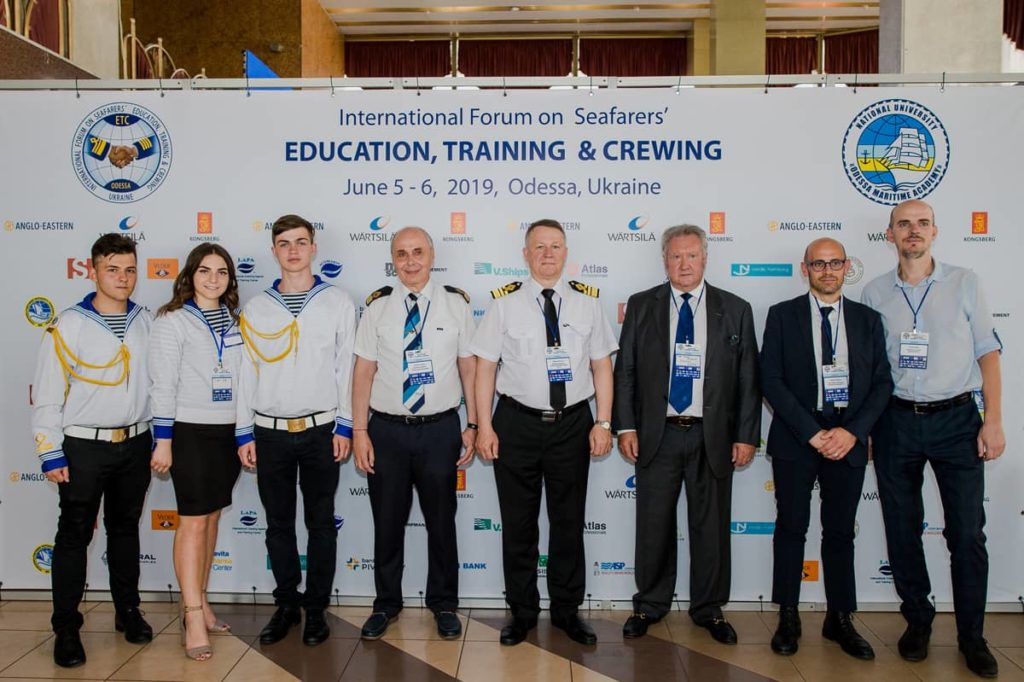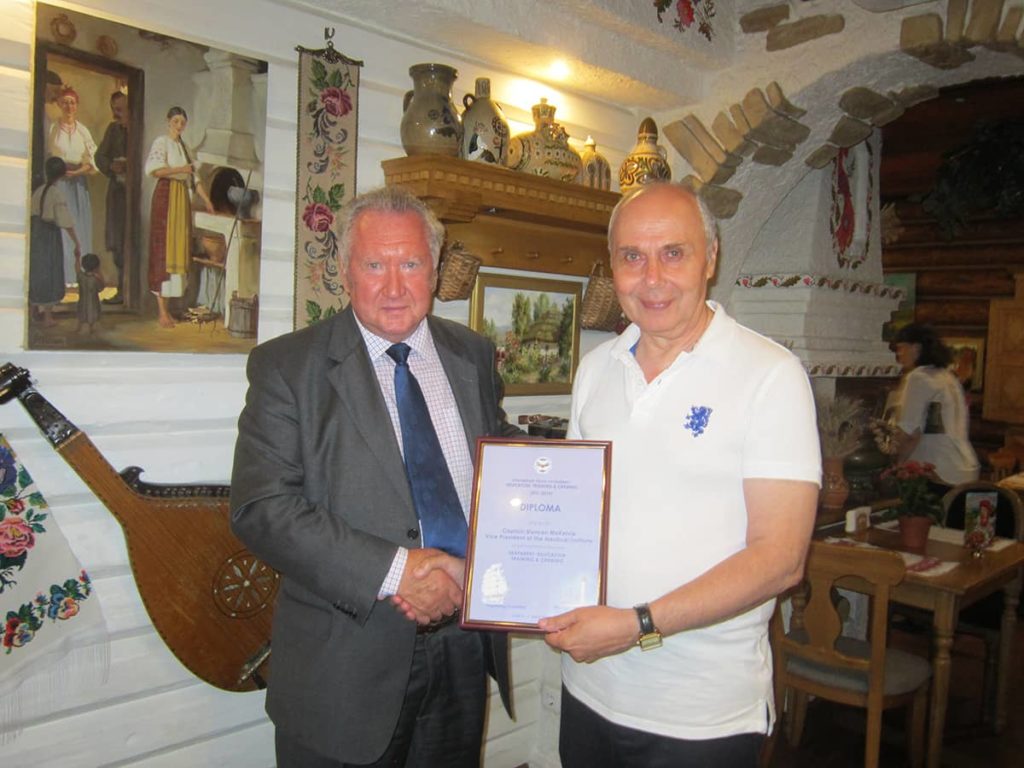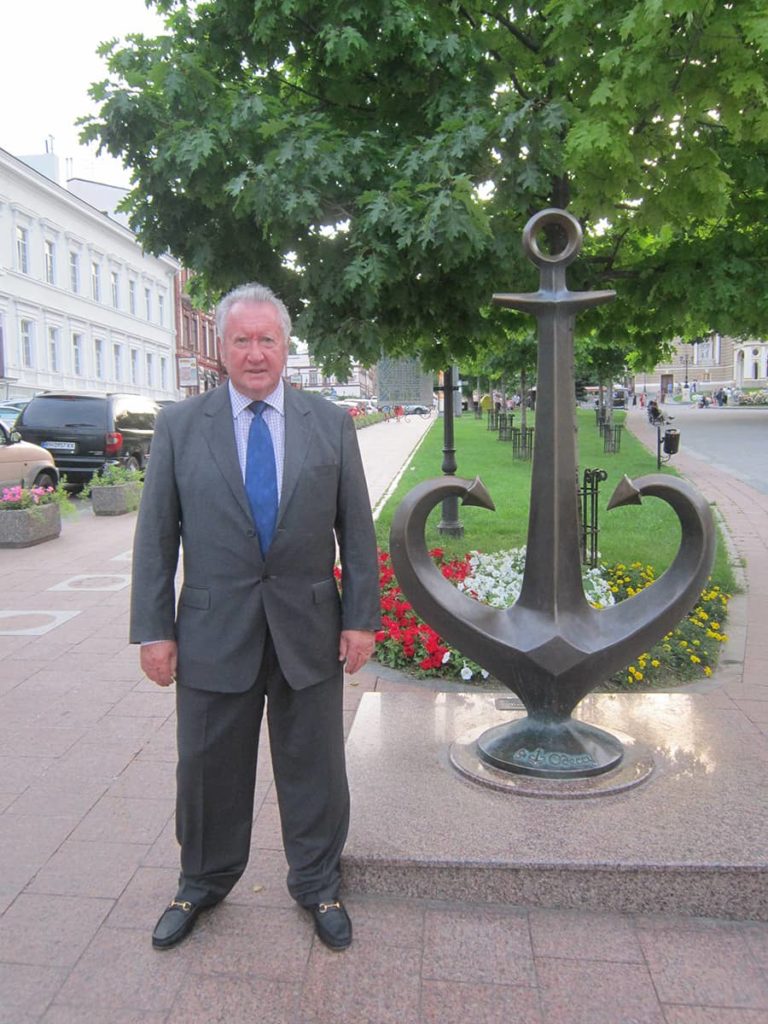I was fortunate indeed to be able to travel to Odessa to attend the ETC Forum in June, to represent the President, Capt. Nick Nash FNI CMMar who was unfortunately indisposed. This well-attended and very well organised event is a major part of the Ukraine Maritime calendar, with attendance from as far afield as Hong Kong, West Europe and Scandinavia as well as the local region. These events benefit greatly from this sort of cosmopolitan makeup and it brings diversity of views conditioned by local events and practices all of which sparks debate, stimulates thought and makes the event lively and very worthwhile.
There were approximately 200+ attendees of whom quite a number were cadets and staff from the Maritime University. Attendance was kept up close to 100% over the 2 days of the event and interest and involvement were high. Good to see. There was a simultaneous exhibition going on in the lower hall; mainly local universities, training facilities and manning agencies with a few shipping companies represented (VShips, MSC etc.) and ancillary services such as uniform supply, travel agencies, unions etc. Footfall for the exhibition was reckoned to be about 1200 per day. The forum format was a series of 20 or 30 minute presentations followed by a one hour panel discussion under a moderator following a number of topic themes.
After the opening ceremony on day one the first session was Ship Management and Maritime Human Resources, then Seafarers Competence and the Human Element, and finally Maritime Education, Training and Certification. Day two started with Latest Technological Developments for Shipping and MET, then Modern Crew Management and finished with a choice of 3 round table discussions. Criminalisation of Seafarers, Blended Learning and the Future of Simulation Training and Seafarers Continuing Professional Development.
I delivered the President’s video on day one and believe it went down well, particularly among the cadets. The questions posed in the panel discussion which I shared with Cleo Doumbia Henry of WMU , Oral Edogan of Piri Reis University , Boyan Mednikarov of Nikolai Vaptsarov Naval Aceademy and Arjen Minjes of Harlingen Maritime Academy, included 1) Maritime education for the digital era. 2) Leadership training and maritime resource management. 3) Future comprehensive review of STCW convention and STCW code. 4) The need for an education degree for certification of officers. 5) Polar code and ice navigation. As is often the way the moderators interpret their brief a little loosely, possibly to fit the mood and movement of current and prior discussion and earlier points made and this was the case here with some questions being combined and some altered a little.

1) Following a statement from Professor Edogan that while ’new maths’ were being proposed to students, the industry was more desirous of ‘old maths’ I made the point that from NI point of view our concern was the promotion of high standards of knowledge, qualification and competence and that the education being given at all levels had to realistically fit the seafarer for the ships of today in what is ultimately a practical industry. This followed an opinion from Cleo Doumbia-Henry that we should be focussing on the prospect of autonomous shipping.
2) There was an opportunity here to highlight an example of leadership in action in the President’s video just viewed and to discuss the definition and types of leadership. Also a chance to mention mentoring and the NI publications on leadership, Bridge Team Management and to discuss whether leaders can ever be ‘made’. A bit brief, this discussion was actually going somewhere with marked differences of approach between the academics and the mariners.
3) There was little dissent that 2010 amendments to STCW were only a stopgap and that a complete overhaul was more than due. However, we had heard earlier in the day that IMO had delayed any ‘piecemeal’ work on STCW and the most likely scenario was a complete re-work in 2021. There was, however universal agreement that STCW is only a minimum standard and has to be routinely exceeded.
4) Some marked difference again between the academics and the mariners on whether an education degree was necessary for the certification of officers. I made the point that what is normal in some countries, i.e. to leave college with a degree and an STCW ticket was certainly not so in all and in particular not so in a large number of those countries with the oldest and most established tradition. I briefly outlined the availability of degree courses in the UK for those wishing to aim for a specific target within the industry or to change career path but not for seagoing service. I talked of the prestige afforded to some in the past with the existence of the Extra Master’s Certificate and how in a sense we may be said to be going back to the future with the new Chartered Master Mariner qualification offered through the HCMM and facilitated by the NI. This sparked some interest and seemed to strike a chord with the rector of the Odessa Maritime Academy who is himself a Chartered Engineer and FIMarEST.
5) This question on the Polar Code was largely glossed over which was a pity as I wanted to highlight NI accreditation of Ice Navigation training facilities and the various publications.
My first trip to sea was to the Black Sea, not Odessa but the port of Poti, in Georgia. That was as a cadet on an ore carrier and I have waited over 50 years to make the return to the Black Sea but this time to a city full of surprises. My wife now wishes she had accompanied me on this visit to – I have talked so much about Odessa and the warmth of the welcome and the great organisation by the local NI branch and in particular Professor Vladimir Torskiy FNI.
To the first time visitor the aspect of Odessa is broad, open boulevards and a distinctly French influence to the architecture. A university city of culture and refinement with some unique features and clearly influenced very much by its position and the importance of the port in its development. Not least of the better known attraction and sights of Odessa are the Potemkin Steps and much less well known outside of the region, the catacombs, which I was also fortunate enough to be able to visit. Hard to accept that there are over 3000 km of tunnels and caves under the city but it does answer my question of why there was no metro!

On the first evening of the forum we experienced first class hospitality in a relaxed atmosphere for dinner at a beach club. Amazing talent shown by the cadets from the Maritime University, who provided the stage show, ranging from tango dancing to singing and gymnastics. This evening gave us a chance to get to know each other better and it is always good to get a chance to speak to others involved in this industry. Good also for me to be able to meet other NI members and to find interest in such NI initiatives as the Chartered Master Mariner scheme and the Young Members Council. A major part of our strength as an International Institute is in the diversity of our membership and the contribution of knowledge and experience each part brings. This is especially true here in Ukraine where we have one of the most vigorous and accomplished branches. Very well organised and led, they contribute hugely to the overall aims and objectives of the institute.
A high point for me was the dinner in a typical Ukrainian restaurant with the branch committee and at which I had the pleasure and honour to present Capt. Alex Sagaydak FNI with a Certificate of Appreciation for his work with the NI IMO committee. This followed a performance at the stunning Opera House by the Kurcher Kammerorchester. An excellent performance and much enjoyed by all.
All who attended will take away different points and memories from the forum. For me the stand-out comment of the whole forum was the answer by a young cadet who, when asked by one of the moderators why he wanted to go to sea, answered, “because it is a very highly regarded profession and would give me a high standing and respect in society”. How nice to hear that.

Capt. Duncan McKelvie FNI
VP The Nautical Institute